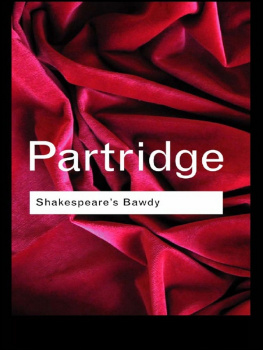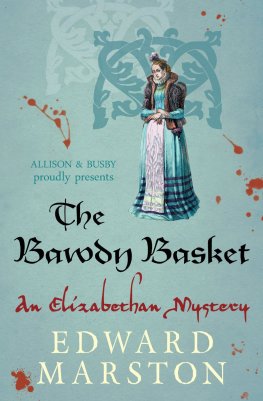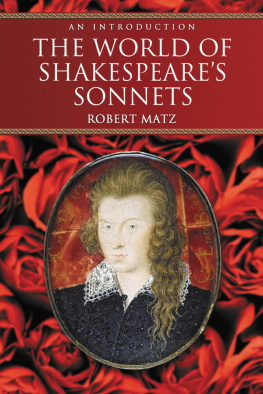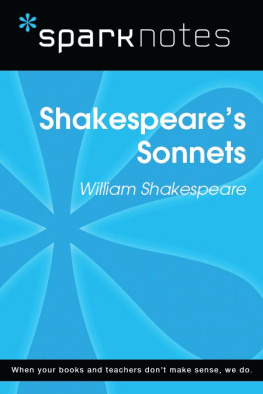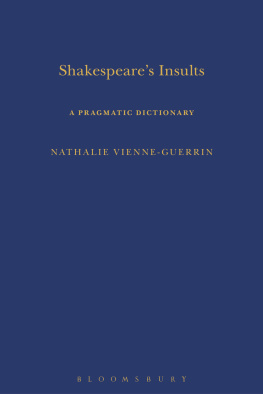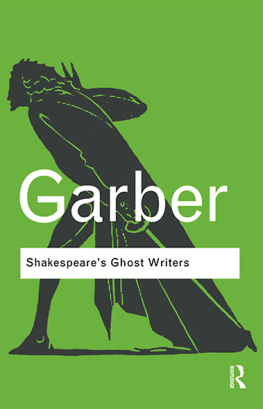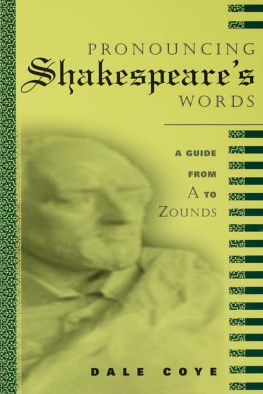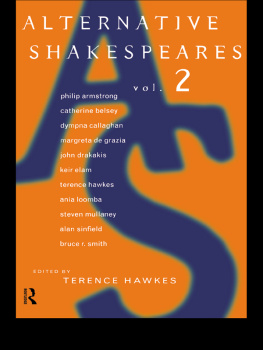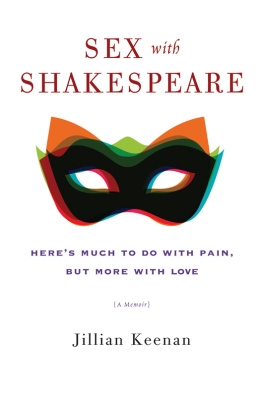Shakespeares Bawdy
Eric was a human lexicographer, like Samuel Johnson. He was a philologist rather than a linguist. He knew what Chomsky was doing and what had happened to phonology in Prague, but he eschewed the strict scientific approach. Linguistics is scared of semantics and prefers to concentrate on structures, leaving the study of the meaning of words to anthropologists - or, perhaps with misgivings, to Johnsonian word-lovers like Eric Partridge.
Anthony Burgess
Shakespeares Bawdys status as a pioneering study remains unchallenged.
Ralph Elliott
Partridge remains the standard introduction on the subject.
Reference Reviews
Eric
Partridge
Shakespeares Bawdy
With a foreword by Stanley Wells
First published 1947
by Routledge & Kegan Paul
Second edition 1955
Third edition 1968
First published in Routledge Classics 2001
by Routledge
11 New Fetter Lane, London EC4P 4EE
29 West 35th Street, New York, NY 10001
Routledge is an imprint of the Taylor & Francis Group
This edition published in the Taylor and Francis e-Library, 2005.
To purchase your own copy of this or any of Taylor & Francis or Routledges collection of thousands of eBooks please go to www.eBookstore.tandf.co.uk.
1947, 1955, 1968, Eric Partridge
All rights reserved. No part of this book may be reprinted or reproduced or utilised in any form or by any electronic, mechanical, or other means, now known or hereafter invented, including photocopying and recording, or in any information storage or retrieval system, without permission in writing from the publishers.
British Library Cataloguing in Publication Data
A catalogue record for this book is available from the British Library
Library of Congress Cataloging in Publication Data
A catalog record for this book has been applied for
ISBN 0-203-99597-X Master e-book ISBN
ISBN 0-415-25553-8 (hbk)
ISBN 0-415-25400-0 (pbk)
FOREWORD
), apparently meaning tonguing the penis is not recorded in the Oxford English Dictionary or its supplements.
Of course, Partridge was writing at a time when all editions of Shakespeare intended for use in schools were bowdlerized, when editors even of scholarly editions frequently shied away from sexual glosses, and when attitudes to expressions of sexuality were far less liberal than they were to become during the 1960s. He was a pioneer. Before his time studies had existed of what Hilda Hulme, in her Explorations in Shakespeares Language (1962), was to call The Less Decent Language of the Time, notably the seven-volume Dictionary of Slang and its Analogues by John S. Farmer and W. E. Henley (New York, 18903). But the great Oxford English Dictionary (18881928) ignores many sexual words and expressions even though, for example, cunt, said by Partridge to be the most notorious term of all for what he calls the pudendum muliebre, is, as he says, of impeccable Aryan origin, without any brutal or sadistic associations, undertones, or crescive overtones. (Shakespeare does not use the word directly.) Both Alexander Schmidts Shakespeare-Lexicon (2 vols, Berlin and London, 18745) and the Shakespeare Glossary (1911) prepared by C. T. Onions (one of the compilers of the Dictionary, of which the Glossary is an offshoot), are similarly restrictive. By contrast, Shakespeares Bawdy helped to lead the way towards a new freedom and honesty in acknowledging and investigating the full extent of Shakespeares linguistic range and in responding to the sexual resonances of a substantial section of his vocabulary. As attitudes relaxed, it appeared in a New Popular Edition in 1955, was reprinted in 1956 and 1961, and was revised and enlarged by the author for a new edition (reprinted here with minor corrections) of 1968. Partridge died in 1979 at the age of 85.
Though the Glossary forms the bulk of Shakespeares Bawdy, this is not simply a reference book. The opening Essay is valuable not least because it provides a helpful guide to the Glossary, alerting the reader to sexual significances in words and expressions that might otherwise appear to lack them. Partridges interest is not primarily critical, but rather scholarly and to some degree biographical. Proclaiming himself neither pederast nor pedant, he counters suggestions made by Oscar Wilde, Samuel Butler, and others that Shakespeare may have been homosexual, while deducing that the dramatists attitude to homosexuality, as that of every thinking person must be, was extremely tolerant ().
The critical implications of Partridges work have been carried forward in, notably, E. A. Colmans The Dramatic Use of Bawdy in Shakespeare (1974), which also includes a glossary; a later, more fanciful glossary with aims related to Partridges is Frankie Rubinsteins A Dictionary of Shakespeares Sexual Puns and their Significance (1984); but neither work supersedes Partridge. He has his limitations; for instance, he omits quean (which can mean whore), fails to note the sexual significance of Dogberrys claim to be as pretty a piece of flesh as any is in Messina, and (like both Colman and Rubinstein, who generally errs by excess), of bud (probably having as its secondary sense the glans of the penis in Sonnet 1). Colman () rightly points to Partridges failure to provide explicit defence for interpretations such as the gloss To experience sexual emission on come, but though Colman may be correct in saying that this is not a demonstrably Shakespearian usage, he himself provides a quotation from Dekker showing that the sense was available to Shakespeares audience, which means that it should be included among potential contemporary meanings.
Reviewing the first edition of Shakespeares Bawdy, Edward Hubler remarked that The glossary will clarify passages which have been but dimly understood even by Shakespeare scholars, and the introductory essay will provide the reader with wellfounded generalizations on the range and nature of Shakespeares usage (Journal of English and Germanic Philology 47 (1948), p. 245). The tribute remains valid. Shakespeares Bawdy is a classic of Shakespeare scholarship well worthy of republication even perhaps particularlyfor the more liberated readership of the present time.
Stanley Wells
PREFACE
In the 18th Century, this book, or one like it, could have been published; in the Victorian period, not; up till (say) 1930, it would have been deprecated; nowadays, it willas it should be taken very much as a matter of course. (The apparently provocative title is merely a convenient abridgement of Sexuality, Homosexuality, and Bawdiness in the Works of William Shakespeare.)
If Shakespearean criticism had not so largely been in the hands of academics and cranks, a study of Shakespeares attitude towards sex and his use of the broad jest would probably have appeared at any time since 1918. Pederasts and pedants have been the curse of Shakespearean biography and criticism (Hesketh Pearson, 1942): the academic critics (except Professors Dover Wilson and G. Wilson Knight) have, in the main and for most of the time, ignored the questions of homosexuality, sex, bawdiness: with one or two notable exceptions, they have been pitiably inadequate. The non-academic critics have done better on the homosexuality, but none of them has dealt fully, or even satisfactorily, with the normal sexuality and the bawdiness. As I am neither pederast nor pedant, I may be able to throw some light upon a neglected, yet very important, aspect of Shakespeares character and art.

